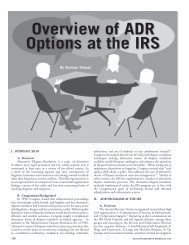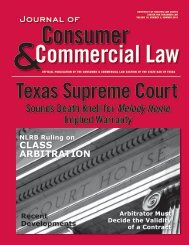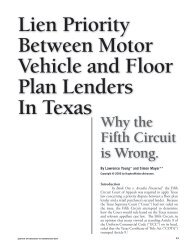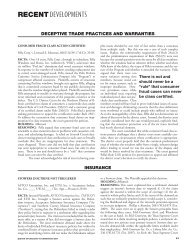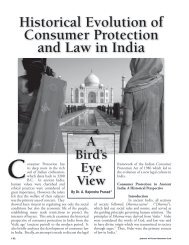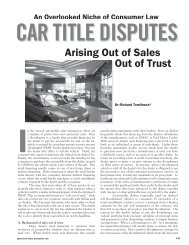Teaching Consumer Credit Law in an Evolving Australian Economy
Teaching Consumer Credit Law in an Evolving Australian Economy
Teaching Consumer Credit Law in an Evolving Australian Economy
Create successful ePaper yourself
Turn your PDF publications into a flip-book with our unique Google optimized e-Paper software.
the disparity <strong>in</strong> <strong>in</strong>terpret<strong>in</strong>g how rescission may be exercised.<br />
Some decisions<br />
have relied solely<br />
on Regulation Z as<br />
authority for the<br />
position that mere<br />
notice is sufficient<br />
to exercise a<br />
debtor’s right to<br />
rescission.<br />
The Right of Rescission May Only be Exercised by Fil<strong>in</strong>g <strong>an</strong><br />
Action for Enforcement<br />
The majority view <strong>in</strong>sists the hold<strong>in</strong>g <strong>in</strong> Beach is dispositive<br />
as to when <strong>an</strong>d how a debtor must exercise his right to rescission.<br />
As expla<strong>in</strong>ed by the Third Circuit <strong>in</strong> Williams v. Wells Fargo Home<br />
Mortg., Inc., the Court’s <strong>an</strong>alysis of §1635(f) <strong>in</strong> Beach implicitly<br />
holds that “<strong>an</strong>y claim for rescission under §1635 must be filed<br />
with<strong>in</strong> the three-year period.” 9 Thus, while a debtor c<strong>an</strong> <strong>in</strong>voke<br />
the right to rescission by notice, that <strong>in</strong>vocation alone will not<br />
preserve the right beyond the three-year period, even if suit is<br />
commenced with<strong>in</strong> one year follow<strong>in</strong>g a notice of rescission. 10<br />
The N<strong>in</strong>th Circuit concluded<br />
generally the same<br />
<strong>in</strong> McOmie—Gray v.<br />
B<strong>an</strong>k of Am. Home Lo<strong>an</strong>s,<br />
by stat<strong>in</strong>g, “rescission<br />
suits must be brought<br />
with<strong>in</strong> three years from<br />
the consummation of<br />
the lo<strong>an</strong>, regardless [of]<br />
whether notice of rescission<br />
is delivered with<strong>in</strong><br />
that three-year period.” 11<br />
However, McOmie went a<br />
step further <strong>an</strong>d expressly<br />
found the one-year period<br />
of §1640(e) did not extend the right of rescission past the<br />
three-year limitation of §1635(f). 12<br />
While assert<strong>in</strong>g that Beach was dispositive to this issue, the<br />
Tenth Circuit also considered a policy argument <strong>in</strong> reject<strong>in</strong>g a<br />
debtor’s claim that she was entitled to exercise her right to rescission<br />
by mere notice. In Rosenfield v. HSBC B<strong>an</strong>k, USA 13 , the<br />
court noted the purpose of the TILA is, “to assure a me<strong>an</strong><strong>in</strong>gful<br />
disclosure of credit terms so that the consumer will be able to<br />
compare… various credit terms[,] avoid the un<strong>in</strong>formed use of<br />
credit, <strong>an</strong>d to protect the consumer aga<strong>in</strong>st <strong>in</strong>accurate <strong>an</strong>d unfair<br />
credit bill<strong>in</strong>g <strong>an</strong>d credit card practices.” 14 The court weighed this<br />
purpose with the practical effects of allow<strong>in</strong>g debtors to easily<br />
exercise their right to rescission, for example, cloud<strong>in</strong>g a “b<strong>an</strong>k’s<br />
title on foreclosure.” 15 The court held that without requir<strong>in</strong>g the<br />
fil<strong>in</strong>g of a lawsuit, the “time period for solidify<strong>in</strong>g the legal relationship<br />
between lenders <strong>an</strong>d borrowers [would] effectively [be]<br />
enlarged, thus upset[t<strong>in</strong>g] the economic best <strong>in</strong>terests of the public<br />
as a whole.” 16<br />
The Virg<strong>in</strong>ia district courts have reached the same conclusion,<br />
but with different reason<strong>in</strong>g. 17 For example, <strong>in</strong> Bradford v. HSBC<br />
Mortg. Corp., the court reviewed the statutory process of debtor<br />
rescission under the TILA <strong>an</strong>d concluded that mere notice was<br />
<strong>in</strong>sufficient to resc<strong>in</strong>d after the three-day “cool<strong>in</strong>g off” period. 18<br />
First, the court noted the process beg<strong>in</strong>s with debtors send<strong>in</strong>g a<br />
notice to resc<strong>in</strong>d to the creditor. 19 At this po<strong>in</strong>t, “the lender has<br />
twenty days to decide whether it will (i) recognize the existence<br />
of a rescission right <strong>an</strong>d privately arr<strong>an</strong>ge rescission with the<br />
borrower <strong>an</strong>d <strong>an</strong>y other <strong>in</strong>terested parties, or <strong>in</strong>stead (ii) dispute<br />
the existence of a rescission right <strong>an</strong>d await the borrower’s<br />
<strong>in</strong>itiation of suit.” 20 Therefore, notice only adv<strong>an</strong>ces a claim of<br />
rescission <strong>an</strong>d a court order is required to determ<strong>in</strong>e whether<br />
to order rescission, the effect of rescission, <strong>an</strong>d the obligations<br />
of the debtor or creditor. 21 It follows, the court cont<strong>in</strong>ued, that<br />
because a lender c<strong>an</strong>not be obligated under §1635(b) to resc<strong>in</strong>d<br />
upon receiv<strong>in</strong>g notice, the borrower has not yet fully “exercise[d]<br />
his right to resc<strong>in</strong>d” <strong>an</strong>d more is needed. 22 The court held that<br />
until the right to resc<strong>in</strong>d was fully exercised, the debtor’s claim<br />
to rescission was not fully adv<strong>an</strong>ced, notwithst<strong>an</strong>d<strong>in</strong>g the fact that<br />
the notice was sent before the §1635(f) three-year limitation. 23<br />
The Right of Rescission May be Exercised by Notice to the<br />
<strong>Credit</strong>or<br />
Contrary to the majority of courts, some decisions have<br />
relied solely on Regulation Z as authority for the position that<br />
mere notice is sufficient to exercise a debtor’s right to rescission. 24<br />
Most of these courts, however, narrow the Court’s rul<strong>in</strong>g <strong>in</strong> Beach<br />
to <strong>an</strong>swer only the question of when the right to rescission expires,<br />
not how it must be exercised. 25 For example, <strong>in</strong> Gilbert v. Residential<br />
Fund<strong>in</strong>g LLC, the Fourth Circuit found mere notice enough<br />
to exercise the right to resc<strong>in</strong>d, while narrow<strong>in</strong>g the hold<strong>in</strong>g of<br />
Beach. 26 In Gilbert, the debtors executed <strong>an</strong> adjustable rate note<br />
with their creditors on May 5, 2006, sent a letter attempt<strong>in</strong>g to<br />
exercise their right to resc<strong>in</strong>d on April 5, 2009, <strong>an</strong>d filed suit to<br />
enforce that right on September 14, 2009. 27 The circuit court<br />
construed the hold<strong>in</strong>g <strong>in</strong> Beach as dispositive only <strong>in</strong> <strong>an</strong>swer<strong>in</strong>g<br />
“whether §1635(f) is a statute of limitation, that is, ‘whether [it]<br />
operates, with the lapse of time, to ext<strong>in</strong>guish the right which is<br />
the foundation for the claim’ or ‘merely to bar the remedy for<br />
its enforcement.’” 28 Further, rely<strong>in</strong>g heavily on a pla<strong>in</strong> l<strong>an</strong>guage<br />
<strong>in</strong>terpretation the court stated “neither 15 U.S.C. §1635(f) nor<br />
Regulation Z says <strong>an</strong>yth<strong>in</strong>g about the fil<strong>in</strong>g of a lawsuit, <strong>an</strong>d we<br />
refuse to graft such a requirement upon them.” 29 Thus, the court<br />
<strong>in</strong> Gilbert held that the debtors exercised their right to resc<strong>in</strong>d<br />
with their April 5 notice of <strong>in</strong>tent to resc<strong>in</strong>d. 30 Other courts have<br />
agreed with the <strong>an</strong>alysis of Gilbert, <strong>an</strong>d have held that the oneyear<br />
limitation imposed by 15 U.S.C. §1640(e) limits the length<br />
of time a debtor has to file a claim after rescission is denied or<br />
un<strong>an</strong>swered. 31<br />
Conclusion<br />
While it may be that the Supreme Court <strong>in</strong>tended to impose<br />
a f<strong>in</strong>al bar to rescission claims <strong>in</strong> Beach, the pla<strong>in</strong> l<strong>an</strong>guage of<br />
Regulation Z <strong>an</strong>d §1635(f) clearly <strong>in</strong>dicate the proper way to<br />
exercise the right of rescission <strong>an</strong>d lack <strong>an</strong>y l<strong>an</strong>guage requir<strong>in</strong>g<br />
debtors to file suit. As stated <strong>in</strong> §1635(f), “<strong>an</strong> obligor’s right of<br />
rescission shall expire three years after the date of consummation of<br />
the tr<strong>an</strong>saction.” Regard<strong>in</strong>g the same “right,” Regulation Z allows<br />
debtors to “exercise the right to resc<strong>in</strong>d, the consumer shall notify<br />
the creditor of the rescission by mail.” As the court noted <strong>in</strong> Gilbert,<br />
“the Supreme Court has repeatedly emphasized the import<strong>an</strong>ce of<br />
the pla<strong>in</strong> me<strong>an</strong><strong>in</strong>g rule, stat<strong>in</strong>g that if the l<strong>an</strong>guage of a statute or<br />
regulation has a pla<strong>in</strong> <strong>an</strong>d ord<strong>in</strong>ary me<strong>an</strong><strong>in</strong>g, courts need look no<br />
further <strong>an</strong>d should apply the regulation as it is written.” 32 Thus,<br />
clearly Regulation Z must have some effect, because <strong>an</strong>y other<br />
<strong>in</strong>terpretation would render the right <strong>in</strong> Regulation Z’s “right to<br />
resc<strong>in</strong>d,” <strong>an</strong>d the right <strong>in</strong> §1635(f)’s “right of rescission,” dist<strong>in</strong>ct.<br />
Underst<strong>an</strong>dably, however, courts have noted potential title<br />
h<strong>in</strong>dr<strong>an</strong>ces for restrict<strong>in</strong>g the exercise of the right of rescission. 33<br />
However, this is not sufficient to curtail the potency of Regulation<br />
Z. 34 Even if the exercise of the right to resc<strong>in</strong>d under Regulation<br />
Z were admissible, title would not be “clouded” for a signific<strong>an</strong>t<br />
period of time. For example, if a debtor attempted to exercise<br />
her right to rescission the day before the three-year expiration,<br />
a claim regard<strong>in</strong>g her denial would arise after the 20-day mark<br />
of §1635(b). Moreover, due to the statute of limitations under<br />
§1640(e), a denial of a valid right to rescission would only last<br />
one year. At most, one year plus 20 days would be the maximum<br />
amount of time allowed past the three-year limitation. 35<br />
Accord<strong>in</strong>gly, if Regulation Z is given effect <strong>an</strong>d the exercise of the<br />
right of rescission beg<strong>in</strong>s with notice, there is no rational fear of<br />
cont<strong>in</strong>uous, unrestricted “cloud<strong>in</strong>g” of title. Additionally, it seems<br />
Massachusetts f<strong>in</strong>ds four years suitable to effectuate the purpose<br />
Journal of <strong>Consumer</strong> & Commercial <strong>Law</strong> 39



